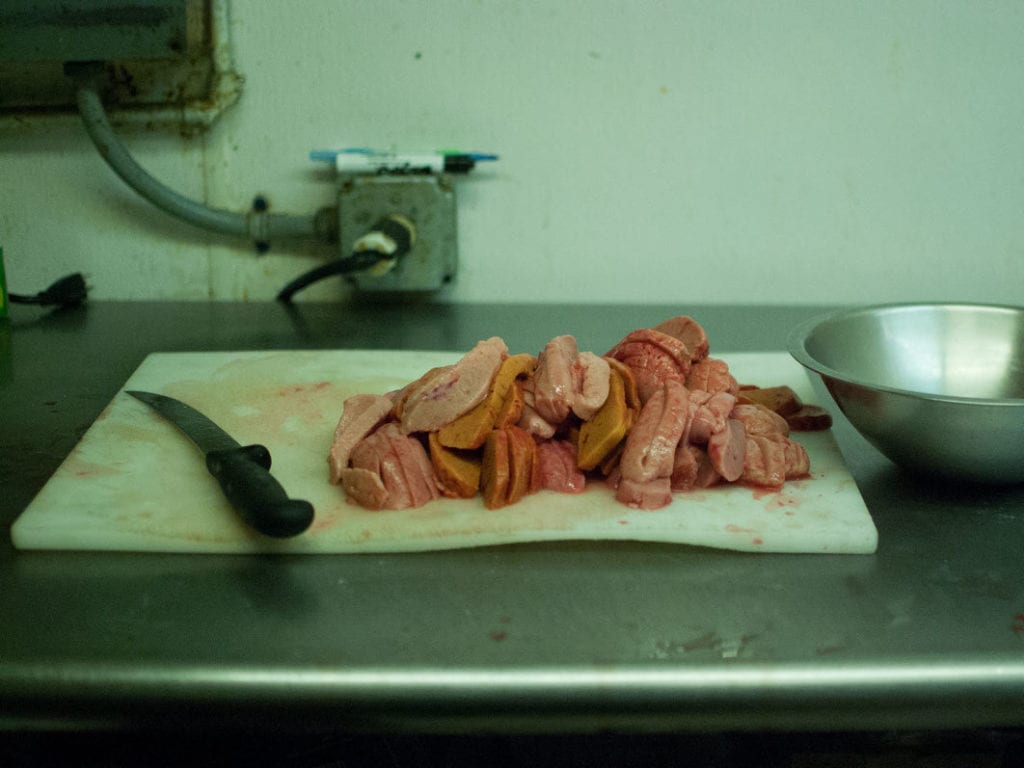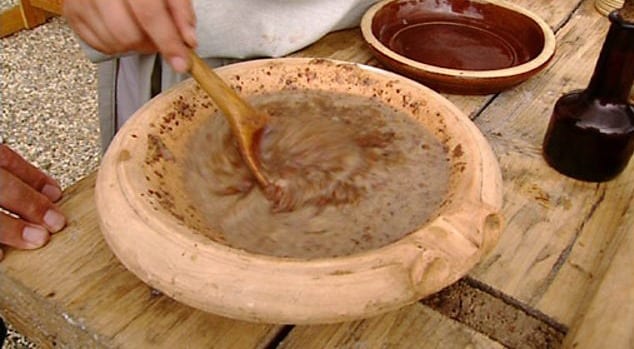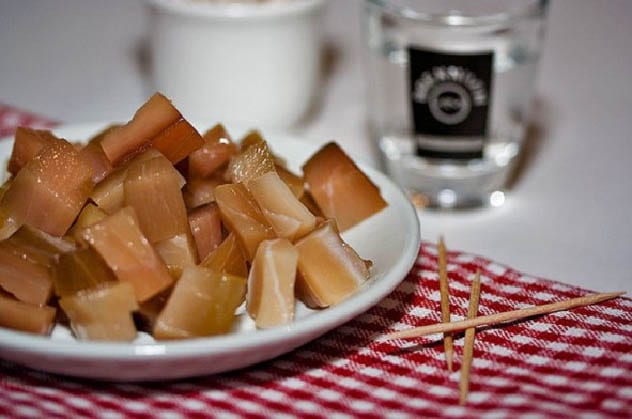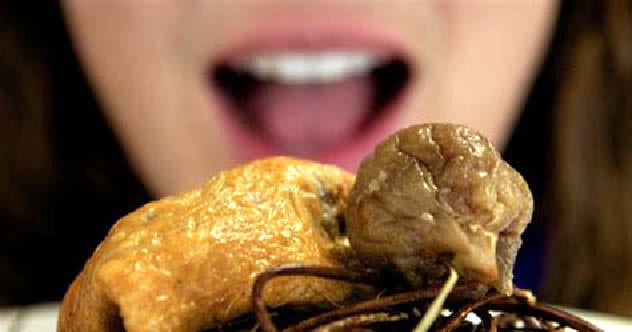We recently published a list on disgusting foods the Chinese eat. We were liberally called names (you can guess which ones) and accused of a bias that ignores our own awesome European (and European-originating) cultures’ foods that may be stomach turning. Obviously a number of these are going to be historic as we tend not to think of most of the foods we eat today as disgusting, but there are a few surprising additions from our current fare. One caveat: I love offal, therefore I am resisting the temptation to bow to the modern tendency to be shocked by fairly traditional cuts of it; so don’t expect a list full of kidneys, livers, and hearts (all of which are delicious and you should try them!)
Top 10 Disgusting Foods The Chinese Eat
10 Alaskan Ice Cream

Step 1: beat a seal to death with a bat. Step 2: wait . . . who cares about step two, let’s take a closer look at step 1! Sure enough, Akutuq (known as Alaskan Indian Ice Cream in Alaska) is an ice cream made in Canada and Alaska with origins in the native Eskimos of the regions but also adopted more broadly by those living there. Whereas the rest of us use fat from eggs or milk to make our ice cream, this one uses caribou fat and oil from freshly beaten seals (yes you can legally beat seals to death in Canada[1]. You can also legally hunt polar bears[2]). It is mixed with berries and sweet roots. And if the idea of sweetened and chilled seal fat doesn’t turn your stomach, how about this: it is traditionally made with he addition of fish and dried moose meat. Yup: fishy, meaty, ice cream made from bashed seals and animal fat. It’s not helped by the fact that it looks like a bowl of sick either!
9 Rocky Mountain Oysters

Known by a variety of names (such as criadillas in Spanish speaking countries, and prairie oysters in parts of North America) these are fried bulls testicles. You can use your imagination when it comes to working out why this dish is named after the slimy shellfish that gives us beautiful pearls. The testicles are served in a variety of ways (the most popular is crumbed) and while they were once food for cowboys, they are now popular in many places amongst regular folk. If you get a hankering for a mouthful of balls, you can drop in to Bruce’s Bar in Colorado where they have been serving them since 1957. In an effort to mix things up, they also serve lamb and bison testes. A number of other American towns also have annual testicle-eating festivals.[3]
8 Blood Clot Soup

Blood sausage (or black pudding as it is also known) is one thing, but a bowl full of blood clots is another thing entirely! Unless you’re Lithuanian. Kraujinë sriuba (Juka) is a soup composed of the flesh of an entire chicken, duck, or goose and a good sized cup full of blood. It is all boiled together with a few herbs and some barley and eaten with black bread. Blood is a popular dish of many European countries and is eaten in a variety of ways, most commonly, as mentioned, as sausage. But in Scandinavian nations it is also sometimes served as blood pancakes with a side of reindeer meat. On the whole, Lithuanian food is very rich and extremely good and the nation has very low rates of obesity. Maybe we all need to start drinking blood clots![4]
7 Fish Guts

At the height of its use in the first century AD, garum, a sauce made from rotting fermented fish innards, was incredibly popular in the Roman Empire. It was frequently combined with wine, oil, ground pepper, and even just water to make a range of different sauces or drinks that could be consumed straight or added to other meals. Even the most cash-strapped laborer could afford basic garum, while the fanciest version would bankrupt even the wealthy middle-class landowner. Factories dedicated to its production sprang up across the empire, and dedicated trade routes carried the stinking liquid to its furthest reaches. There is no exact equivalent in the West today, though the fish sauces of Asia come close and English Worcestershire sauce is made from fermented whole anchovies (guts included). Wildly popular at the height of the Roman Empire, it faded with its fall and drifted out of Western cuisine, perhaps due to the utter stink of the stuff.[5]
6 Rotten Shark

Talking of stinky, the Icelandic national dish of cured, rotten shark is putrid in the extreme. Made from the Greenland shark, hakarl is poisonous when eaten raw and fairly rank when eaten cured. It’s been fermented in Iceland for centuries and is even mentioned in the Icelandic sagas.The tissues of the Greenland shark contain large amounts of ammonia-rich urea, a compound also found in that well-known delicacy called urine. And if that wasn’t bad enough, the horror is multiplied by curing the shark and then letting it decompose for a couple of months before hacking off chunks of pungent, decaying, rubbery flesh. Some who have eaten hakarl say that it’s the most rancid food on Earth. I’ll take their word for it because I sure as hell don’t plan on ever putting it near my mouth![6]
Top 10 Bizarre Origin Stories About Your Favorite Foods
5 Mice

You might think of a dormouse as a sleepy little hamster or a character in Alice in Wonderland, but to some people, they were (and are) food. In ancient Rome, dormice were roasted as a special delicacy. The Romans raised them in a special terra cotta jar called a glirarium. In the wild, dormice hibernate for the entire winter. In the glirarium, which was kept dark, the dormice hibernated all year, which is how they were fattened. The jars had little staircases for the dormice, places for them to deposit food, and air holes. When they were really fat, the dormice would be stuffed with nuts and roasted with honey and spices. Usually, they were served as an appetizer. Today, wild dormice are still hunted and eaten in some parts of Slovenia and Croatia and are considered a delicacy. In other places, they are simple snacks served between a couple of bits of bread.[7]
4 Maggot Cheese

Casu Marzu is a traditional Sardinian cheese made from sheep’s milk. But the true grossness factor comes from what the cheese contains: writhing live maggots. The cheese is brought to a stage that some consider to be decomposition. Larvae of the cheese fly (Piophila casei) are brought to the cheese to help break down its fat. They eat through the milky mass, making it soften, and seep a liquid known as lagrima (teardrop). While some people remove the maggots before consumption, many people consume the cheese maggots and all. When doing so, people are advised to cover their eyes, as the maggots can leap out in an attempt to escape. I think I’ll stick to blue vein cheese.[8]
3 Raw Puffin Hearts

Puffins are small birds with black and white feathers; they have cartoonishly oversize beaks and are absolutely adorable. Gordon Ramsay, being no stranger to controversy, recently came under fire for eating the raw heart from a dead puffin he had killed during an episode of his television series The F Word. Animal rights groups were of course up in arms, and many people objected to the cruelty of the act. However, the people of Iceland would not have batted an eye at his actions. The reason for this is that, in Iceland, raw puffin heart is actually considered a delicacy, and puffins are eaten for food all the time. Ramsay actually had all the proper permits and was cleared of any wrongdoing by the media authorities. Now, if the idea of eating puffin hearts makes you sad, grab the tissues . . . because the French eat something worse:[9]
2 Roast Ortolan

This adorable bird is the size of a man’s thumb and weighs less than an ounce. It is meant to be eaten feet first with the beak and head being last so you can enjoy the subtle flavors of the brain when the little skull breaks between your teeth. In 1999 the French government banned its use as food but they also banned the use and sale of sea turtleshell and ivory—yet both are still legally sold via loopholes and legal exceptions for the very rich. The cost one one bird now on the black market is around $180. The late chef Anthony Bourdain, who hanged himself in 2018, ate the bird and described his experience: “I bring my molars down and through my bird’s rib cage with a wet crunch and am rewarded with a scalding hot rush of burning fat and guts down my throat. Rarely have pain and delight combined so well. I’m giddily uncomfortable, breathing in short, controlled gasps as I continue slowly – ever so slowly – to chew. With every bite, as the thin bones and layers of fat, meat, skin, and organs compact in on themselves, there are sublime dribbles of varied and wondrous ancient flavors: figs, Armagnac, dark flesh slightly infused with the salty taste of my own blood as my mouth is pricked by the sharp bones. As I swallow, I draw in the head and beak, which, until now, have been hanging from my lips, and blithely crush the skull.” If the idea of bitting down on the itti-bitty body of an teeny-tiny birdie doesn’t make you cringe, you’re heartless![10]
1 Chemicals . . . Everywhere

It has to be admitted . . . the sheer volume of chemicals of unknown origin should horrify us all. Consider, for a moment, the typical western supermarket. Remove the outside aisles (these are usually fresh foods like vegetables, dairy, and meats) and the cleaning aisles and what you are left with is basically minimal human food doused in chemicals. The chemicals serve many purposes: they add color to anemic products that basically look like sludge when mass produced in factories; they add or enhance flavor, when all the natural flavor in the form of fats is stripped out (due largely to the shockingly incorrect and widespread belief that animal fat is dangerous to humans); and they add texture modifying qualities – to keep powders dry, to keep liquids wet, or to combine items that naturally repel each other together (emulsifiers). While many of these are considered safe (or safe in low doses), the average westerner is now eating a diet of foods that are almost entirely adulterated in some way. To me, that is more disgusting than any other item on this list or any natural food from history. Oh . . . and just to finish things off on really the grossest note possible, three legal food additives you have probably eaten this week are: beaver anal secretions, insects, and human hair from China.[11]
Top 10 Disgusting Things Done to Food and Drink
We Publish Lists By Our Readers! Submit Here . . .
